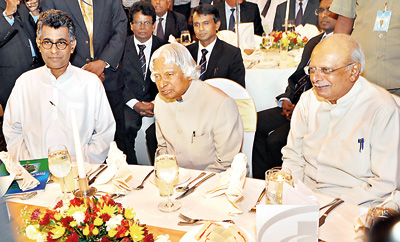News
Sri Lanka can partner in India’s sustainable development: Dr Kalam
View(s):Sri Lanka can be a partner in India’s sustainable development which can be spread to Sri Lanka through the model of Providing Urban Amenities in Rural Areas (PURA), said former President of India, Dr Abdul Kalam. He was addressing the inauguration of the International Symposium on Energy Challenges in the Knowledge Economy (ISECKE) held at Hilton, Colombo, on Friday (26).

(L-R) Minister Champika Ranawaka, Dr. Abdul Kalam and Prof. Tissa Vitarana at the Colombo Hilton. Pic by Indika Handuwela
The ISECKE was organised by the Ministry of Power and Energy to facilitate a rich exchange of knowledge among energy policymakers, researchers, academia and industry who seek solutions to problems of energy economy, sustainability of sources and effectiveness in energy use in the new economy.
The Ministry’s key objective is to make Sri Lanka a 100% energy sufficient country by 2030. Speaking under the theme of SAARC Energy Independence Platform, a Livable Planet Earth, as earth has to be a place that can be lived on, Dr. Kalam said, “86% of the total energy produced comes from fossil fuel, while around 14% is from renewable energy sources and the nuclear sector. “In this situation, it is essential to find innovative methods to reduce the consumption of electric power from fossil fuel and increase the deployment of renewable energy systems.”
He added that, in India, they have already started to work on adapting certain segments to improve the efficiency of electric power usage from fossil fuel, and increase the use of renewable energy systems. “Energy Vision 2030 has to be three dimensional. First, to ensure affordability in access to quality energy for all, second, to ensure that the dependence on depleting fossil fuel is minimised, thereby giving stability to the energy supply, and third, to be balanced against the environmental aspect, by stressing on development of green energy, thereby giving cleanliness to our energy,” Dr Kalam said.
He said that India is busy establishing a sustainable development system, particularly for the development of 600,000 villages through PURA. Employment generation and also clean power and clean water generation will be the focal needs. Dr. Kalam added that Sri Lanka can be a partner in this project as it is an economic proposition related to green technology and application.
He also said that India has launched two ocean satellites to study the dynamics of sea and atmosphere links. “Scientists, technologies, and strategies of both countries can plan and build jointly an ocean satellite between India and Sri Lanka. This ocean satellite can be a research system for planning execution of green nation, green atmosphere linking to oceans of our regions.”
Dr. Kalam concluded by saying he is certain that, with the collective vision and action of India and Sri Lanka, we can ensure prosperity without poverty, peace without fear of war and a happy place to live for all citizens of the nation. Minister Ranawaka spoke of Sri Lanka’s energy sector development plan for a knowledge-based economy, 2015-2025, to make the country an ‘Energy Empowered Nation’.
“We understand that research and development is key to energy sector development, and we are planning the energy symposium on a very special theme, which is Energy Challenges in the Knowledge Economy, in order to make an environment for engineers and scientists to actively participate in our drive towards economical sustainability and prosperity,” the minister said.He added that Sri Lanka’s Knowledge Economy Index is 3.63 and Innovation Index is 0.06, and is ranked 105th in the Global Innovation Index and 101st in Knowledge Economy Index. He said this shows how much we are lagging behind compared with other countries.
He said, “As a country, we have reached comparable achievements in the areas of education, health, life expectancy, infrastructure and goal empowerment. An important challenge we are now facing is energy security. To achieve this, the country should find a module for the primary four pillars, which are sustainable development, to preserve the environment with a multiple balance of biodiversity, social responsibility and individual happiness.”
“I strongly believe that this symposium will pave the way to a new beginning of our scientist community to assist us in this great journey,” he concluded. Managing Director of the Institute for Applied Material Flow Management at the Environmental Campus of Trier University, Germany, Prof. Peter Heck also spoke at the event.

